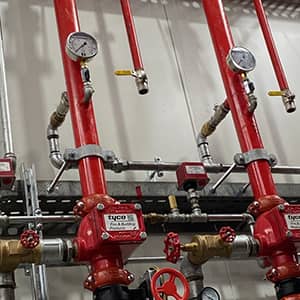Interstate Electrical is a regional, family-owned, commercial electrical contractor with offices in all six New England states. Founded in 1966 by Pat Alibrandi and currently led by his son Jim Alibrandi, Interstate aspires to be a different kind of electrical contracting company – one where individual talent and determination is encouraged and rewarded and one that is equally customer-centric.
‘We want to be seen as ‘not your father’s electrical company"’, explains Bob Sanford, Interstate Electrical’s lead sales engineer. ‘Our innovative vision is to use technology to support our operations and the people in the field, while increasing the value we provide to our customers.’
From a value-add services standpoint, Interstate Electrical tackles everything from Fortune 500-level projects to fit-ups for startups, using design-build and design-assist services with an in-house team of professional engineers and electrical designers. New builds, ground-up restorations and BIM coordination are all hallmarks of the firm’s duties, along with fire alarm installation, testing and monitoring, arc flash hazard analysis, infrared testing, network data cabling and process and building controls installations.
‘Around 2014, we embarked on a lean journey’, recalls Ed Gould, general project site manager, Interstate Electrical. ‘We realised that if we were going to continue to grow and be successful, we had to do our best to streamline the processes that we had, and we did that by creating a value stream map of the project delivery from the point of award to project completion.
The firm had previously been doing prefabrication at a small level for the past 20 years, but after dedicating themselves to lean processes and creating the value stream map, prefabrication and preconstruction became integral parts of its project delivery model.
‘People are not going into the trades like they used to, and yet the projects we were working on were getting bigger and more complex. We had to find a way to fill that gap, and prefabrication fit nicely into our delivery model.’

Assessing the challenges
With the firm fully embracing the adoption of lean methodology, Interstate Electrical could no longer rely on paper drawings, emails and spreadsheets for project delivery. ‘We think of our project delivery as twofold; we have the feet on the street – the people in the field, the technicians, the electricians who are actually building and installing the pieces – and then we have the prefab shop that’s supplying them with pre-built assemblies and pre-tested components’, outlines Sanford.
With many internal and external stakeholders all depending on timely, accurate, yet user-friendly information, going lean created a need to streamline and maximise construction software technology to establish the informational flow necessary for lean success.
‘We would typically get an invitation to tender from our general contractors, which would be the drawing set sent over in a PDF form’, states Sean Coleman, Interstate Electrical project estimator. ‘Then we would take those PDF forms to a secondary software and upload each one of those PDFs into the software; some of these packages come with 60 drawings in each of them, so that upload time could be anywhere between 10 to 30 minutes on some of the larger projects. We would typically do all our counting inside of that software, and then we would take the counts out of that software, put them into an Excel sheet, and send those counts off to our vendors for pricing. And then we would do our quantity survey in yet another software.’
‘Now that we’ve got Bluebeam Revu, we no longer have to upload those PDFs to that second software; we can do all our counting, our measurements, everything, right through Bluebeam Revu.’
Sean Coleman
Project Estimator
Interstate Electrical
As project site manager, Gould would take the engineer’s drawings and specs from the job and transfer the information to all the layouts via hand-marked-up paper drawings. ‘There are multiple layers, and I’m using pen, paper and/or highlighters with a scanner, so every time I’d have to add another layer on to a drawing, I’d have to scan that drawing over and over again, making it harder to read each time to the point where the guys on the site couldn’t even read room numbers anymore’, Gould says. As-built drawings also could not be accurately scaled, leaving time-consuming manual verifications and room for error.
Cut sheets faced a similar problem with no standardisation options for Gould to accurately send information to the prefab team. ‘I used to literally cut and paste images with scissors, put them in the copy machine and zoom in and out, and then tape them onto a page.’
The lack of standardisation options had an impact on the firm’s preconstruction agility, which is a key component for lean construction. This also affected manufacturing and install capabilities due to the potential for miscommunication.
‘The field would get reworked CAD drawings, not my original markups, and they might be missing things or things were not drawn as I had initially drawn them’, states Gould. Those inaccuracies would result in confusion at best, and costly rework at the point of install at worst. With no way to create a mock-up or template, the resulting manual change orders would become tedious and time-consuming paper-based markups for the field and the manufacturing warehouse to separately verify and document.

Revu implementation and workflow enhancements
Interstate Electrical chose to augment existing software solutions with Bluebeam Revu to digitise and simplify these workflows while aligning and disseminating accurate project information across its teams. Bluebeam Studio Sessions would also be used to keep the Interstate Electrical design-build engineering group, design-assist group, estimating group, prefab operation centre as well as project managers and field installers all on the same page during their respective paths toward project success.
‘As a design contractor, we’ll take the project from an existing set of building drawings, or it might be an architectural floor plan that the architects created, and bring it into a Studio Session in Revu’, explains Sanford. The firm can invite or be invited to a Studio Session containing the relevant drawings and iterations for each aspect of project delivery, with the relevant project partners gaining access to the Session via user-created permissions in Studio. ‘We can use Studio in a document management capacity and upload our drawings, our specs and any other details for the project. Collaborators can be invited to the Studio Sessions, so the drawings and documents are all in one place, and we’re able to also markup the drawings directly.’
Interstate Electrical also uses its own custom Tool palette within Revu to standardise its own markups, with the added ability to also get counts without having to use additional pieces of software. ‘We’ll lay out lighting, power, fire alarm, switchgear using the custom Tool palette we built with our symbols in our custom Tool Chest in Revu’, Gould states. ‘After we’ve marked the drawings up as a group, we then upload the PDF set of drawings with markups to a Bluebeam Studio Session so everybody can work and see the markups that we need to make. This cuts down tons of time and we can work more efficiently than somebody working solely in CAD or Revit and maybe forgetting some markups. We find it’s a quicker solution, more accurate, and it lets people work on the same project together to meet a submission deadline.’
‘Revu is a software that allows people who don’t have Autodesk, AutoCAD or Revit skills to be able to detail or markup scope, and it can be universally used by everyone from a labourer in the field to the project manager. It’s a much simpler software that everybody can use.’
Ed Gould
General Project Site Manager
Interstate Electrical
In addition to Studio and Tool Chest, Revu’s Overlay feature is also a crucial part of the company’s digital workflow. ‘The overlay feature in Revu has really changed our process drastically. We do a lot of change orders where we’ll have the same drawings with a lot of small changes throughout the pages’, says Coleman. ‘With the overlay feature, we can have the old version set as a one-colour setup and the new version as a different colour setup, which will automatically bring your eye right to the change, rather than using two sets of drawings side by side and seeing if there was a change of any sort.’
Going digital with Revu has also improved estimation, thanks not only to the Studio Sessions for vendors but also the accuracy of measurements within the digital environment. ‘When we’re doing it with Revu it’s more accurate. We know the drawing will be to scale if we set the drawing to scale; we don’t have to worry about the physical roller scale pressing the wrong button or getting the wrong distance’, says Gould. ‘We can verify what that length was if it changed; we could easily update it by going into Revu and adjusting the length.’
Achieving lean success with Revu
In less than a year’s time since Interstate Electrical has adopted Bluebeam Revu as a part of its lean project delivery strategy, the results have shown dramatic increases in efficiency, collaboration and accuracy. ‘We are proud to call ourselves a lean company now, and for us, lean means flow; it’s all about the flow of quality information to the people who need it, flow of materials from distributor/manufacturer to our prefabrication facility, and then to the on-site installs’, says Gould.
Bidding and estimation workflows in Revu are already showing strong results and transformational value for Interstate Electrical. ‘Bluebeam saves so much time for us’, affirms Coleman. ‘I’ve never had a PDF program that would allow me to create counts. You’d always have to put symbols on a drawing and then convert it to Excel, so being able to do that in one platform allows us to reduce clicks and really improves the process throughout the whole department. For the estimation side, Revu allows us to do more work, which results in higher revenue for the company.’

The process of comparing change orders and an original contract has been streamlined significantly by using the Overlay feature in Revu. ‘A lot of times change orders happen after we’ve already owned our part of the project, so if we miss it, the cost is on us, adds Coleman. Bluebeam eliminates the human error in that process, which also allows us to take on more work and provide a better end-product for our clients.’
Oberried Station: collaborating digitally
‘The biggest thing that will separate us from other contractors is the amount of pre-construction we’re now able to do, whether it be pre-planning in our operations centre, or cases where we’re estimating and purchasing projects sooner. There’s a lot of upfront stuff that’s happening that used to never happen because Revu is helping us to do our jobs quicker and with fewer people.’
Bob Sanford
Lead Sales Engineer
Interstate Electrical
Bluebeam Revu is also making a positive impact on the company’s prefab and field teams. Gould and his teams have used Revu to achieve that informational flow while minimising risk by standardising markups, templates and drawings and sharing them by using real-time collaboration in Studio. ‘We’ve eliminated that middleman, the CAD detailer, who is now free to focus more on the value of that role when we need them’, Gould said. ‘What’s more, if there is an issue, they can go directly to me and we can open up my comments and figure out how to correct the issue because the information is right there.’
‘As for the site crew, they get faster results, as they no longer have to wait for the detailer to mark things up and then send it back and forth’, Gould continued. ‘That was a big issue. Now, it’s much more straightforward: they have my digital drawings at their desk or at the jobsite, with the changes I need, so they can see exactly what needs to be done.’
Standardisation also improved project delivery with Revu, as the Interstate Electrical team leveraged the Tool Chest, Measurements and Legends features. ‘We’re just trying to create standardised templates and standardised assemblies that we can use everywhere for jobs to save time and straighten out that manpower crunch that we always seem to end up in’, explains Gould. ‘The Tool Chest feature allows me to create colour-coded and standard markups that I can use on multiple jobs. Plus, it automatically counts my quantities into the Legends feature in Revu, so I no longer have to count the drawings when I’m done. That solved a lot of problems and time for us.’
‘Our as-built drawings are also much clearer and more accurate than our old as-builts’, Gould said. ‘Before Revu, I used to print schematics from a paper and cut with scissors and tape them onto a paper and run them through the copy machine to make a template. Now I can take drawings, create a template, send it out to the jobsite, have them put some footages on certain things they want; they send it back and it’s right back on the table, being done.’
Interstate Electrical’s focus on finding and using the right technology for project execution and lean construction methodology also allowed the firm to conduct socially distanced manufacturing, which enabled them to continue working on projects during the COVID-19 pandemic.
‘I was just talking to another project manager on a very large-scale project, and there were other electrical contractors who were initially involved but they backed away because the manpower requirement was so large’, says Sanford. ‘We were able to finish that job on time with half the manpower because we had the ability to split our workforce between prefab and the field.’
The company continues its commitment to optimising lean and utilising digital construction at every opportunity. ‘Continuous improvement is part of lean, and going digital with Revu allows us to improve communication and improve informational flow, all while improving our quality by removing unnecessary steps. Bluebeam Revu has absolutely helped us move forward in our lean journey’, concludes Scott Dockendorff, Marketing Manager for Interstate Electric.




